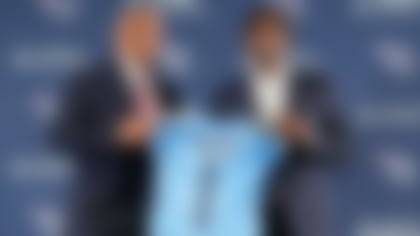NFL Commissioner Roger Goodell said he didn't believe it was appropriate a congressman issued a report accusing the league of improperly trying to influence a National Institutes of Health brain injury study grant review process without speaking to NFL advisors first.
In his report for the U.S. House of Representatives Committee on Energy and Commerce, Rep. Frank Pallone Jr. (D-N.J.) concluded, among other things, that the NFL's leadership and medical advisors were inconsistent with their stated commitment to support science and medicine. In addition, Pallone wrote the Foundation for NIH (FNIH) did not fulfill its role of acting as an intermediary between the NFL and the NIH. The findings, which were made public Monday, were the result of an ESPN report alleging the NFL backed out of funding a study by the NIH based on its objections of bias surrounding the Boston University grantee selected by the NIH to conduct the study.
"A congressman issued that report without talking to any of our advisors," Goodell told reporters at the Spring League Meeting in Charlotte, North Carolina, on Tuesday. "I don't think that's appropriate. I don't think that's the right way to do things."
He went on to state the NIH ultimately is responsible for making decisions about its studies and that the NFL would not pull back the $30 million research contribution it made to the organization.
"We made a commitment to the NIH. It is normal practice for you have to discussions back and forth with the NIH," Goodell said. "We have several members that are advisors on our committees including Betsy Nabel, including (Richard) Ellenbogen, who have had experience with NIH or worked with NIH. These are very important to continue to have that kind of dialogue, two appropriate channels, which our advisors have. They have those relationships. It's a standard practice. We have our commitment of $30 million to the NIH, we're not pulling that back one bit. We continue to focus on things that our advisors believe are important to study. Ultimately, it's NIH's decision."
Goodell also reiterated that the league's "No. 1 priority" is keeping its players safe.
"We have to continue to find ways in which to make our game safer," Goodell said. "We're not done yet. I put that as a very important concern for us going forward, to make the game safer for those playing today and those playing in the future, and to do what we can to help retired players continue to transition through life in a positive way."
Ellenbogen, co-chairman of the NFL's Head, Neck and Spine Committee and one of the doctors named in Pallone's report, disputed allegations he tried to influence the study and grant review process in any way.
In a letter sent to House Energy and Commerce Committee Chairman Fred Upton and Pallone on Tuesday, Ellenbogen denied he and other medical advisors tried to influence the NIH grant selection process for an NFL-funded study. He also said no one from Pallone's staff contacted him in order to clearly understand his involvement with the study or his relationship with the NFL.
"I find this basic lack of fairness, combined with the disregard for the opinions and reputations of the medical professionals named in this report, to be unworthy of the important committee that you lead," Ellenbogen wrote. "At a minimum, I hope you can understand my profound objection to this maligning without so much as the courtesy of a direct question to me by your staff."
The report stated Ellenbogen "should not have participated in conversations with NIH and the Foundation for the National Institutes of Health about the NFL's concerns" regarding the merits of the study.
"Dr. Ellenbogen's participation in these discussions contravenes the spirit of the NIH conflict of interest rules, which are designed to ensure that individuals who have a financial interest in the outcome of a grant award are not involved in the decision-making process to award such a grant," the report stated.
Ellenbogen denied he had a financial interest in decisions tied to the study.
"To be clear, I am not and never have been paid by the NFL nor have I ever received funding through the research grant dollars in question," Ellenbogen wrote. "I am a physician on the front lines of this issue, treating kids and counseling parents every day on understanding concussions and repetitive head injury."












